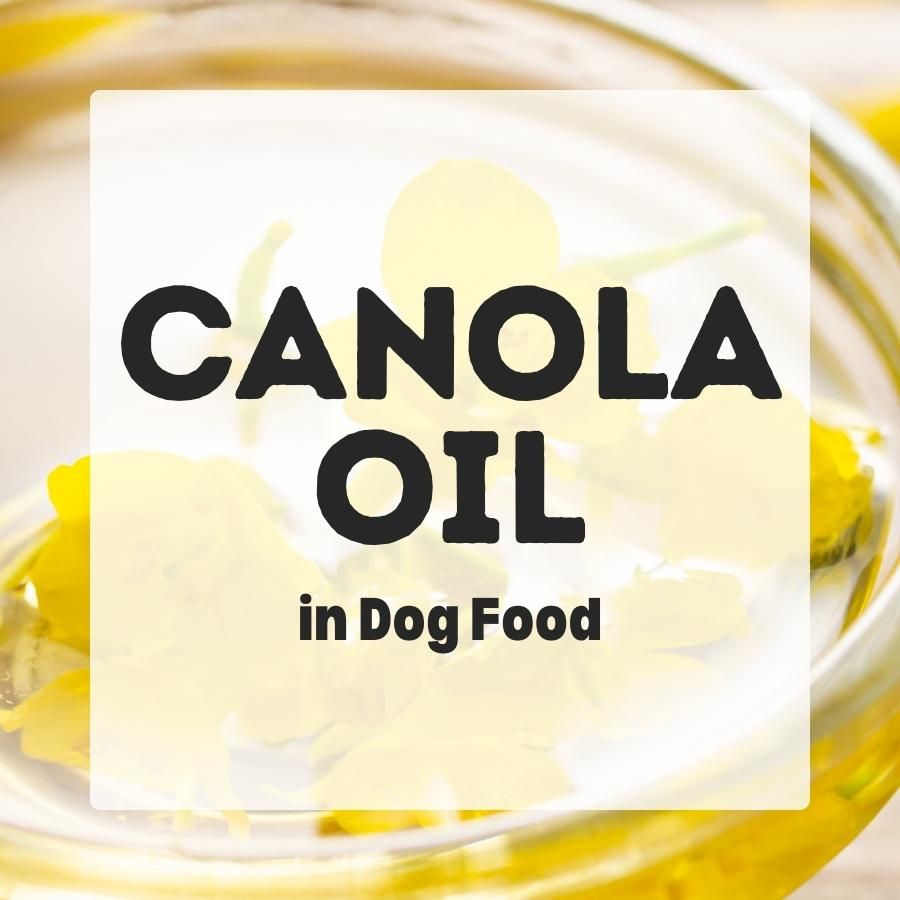Canola oil is a refined vegetable oil rich in monounsaturated fats. It provides some omega-6 and omega-3 fatty acids. But overall, canola oil in dog food is not that common.
Contents
What is Canola Oil?
Canola oil is a highly refined vegetable oil produced from rapeseed (Brassica napus, Brassica rapa, Brassica juncea).
Rapeseed is the most widely cultivated crop species in the Brassicaceae family. It is related to many other vegetables such as cabbage, mustard, turnip, radishes, and cauliflower.

Canola oil is a cost-effective source of fat.
It is made by slightly heating and then crushing the seeds. The next step involves oil extraction with mechanical pressure or by using hexane solvent, which is recovered at the end of processing.
Canola meal is a protein ingredient in dog food that is made from the residues of canola oil extraction.
Historically, rapeseed was eaten in limited quantities due to high levels of erucic acid and glucosinolates.
These compounds made it less palatable and less nutritious while long-term exposure could potentially cause health problems.
However, since the 1970s, new cultivars have been developed. These were bred for a lower erucic acid and glucosinolate content, making rapeseed oil edible.
To set these new edible rapeseed cultivars apart from the unpalatbale ones, they were branded as canola (short for “Canada oil low acid“)[1].

Canola oil is considered a healthy vegetable oil because it is low in saturated fat and high in monounsaturated fats. But there is also some conflicting information about long-term consumption.
It contains both omega-6 and omega-3 fatty acids in a ratio of 2:1 and phytosterols which can have a cholesterol-lowering effect.
However, canola oil is highly refined and in most of the cases genetically modified, which understandably raises concerns or makes it unpopular with some dog owners.
Canola Oil in Dog Foods
Canola oil in dog food can be used as a source of fat for energy and flavor. It provides a blend of omega fatty acids for skin and coat health, as well as some vitamin E and vitamin K1.
Canola oil is included in way fewer dog food products than animal fats like beef or chicken fat. And some dog owners feel that vegetable oils are not an adequate source of fat for dogs.
They consider other fat sources more desirable, such as whole fish ingredients like mackerel and salmon.
While it may not always be the preferred source of fat among dog owners, canola oil is a reasonable, straightforward, and cost-effective option for many dog food brands and manufacturers.

Canola oil is rich in monounsaturated oleic acid and provides lots of omega-6 linoleic acid (19%) paired with high amounts of omega-3 linolenic acid (9%).
It compares well with other vegetable oils.
Canola oil can tolerate high temperatures, which should be taken into account in processed dog food products.
But there are many other fat sources that manufacturers can choose from such as animal fat, fish oil or flaxseed oil.
And it’s not entirely clear whether canola oil is the most beneficial option for a static everyday formula most dogs get to eat.
In general, variety is a good strategy in nutrition.
So while choosing a dog food with a good source of fat is wise, supplementing small amounts of other oils can be an option.
Further Reading
[1] Greg Aldrich (2009): Is canola oil toxic? Pet Food Industry
